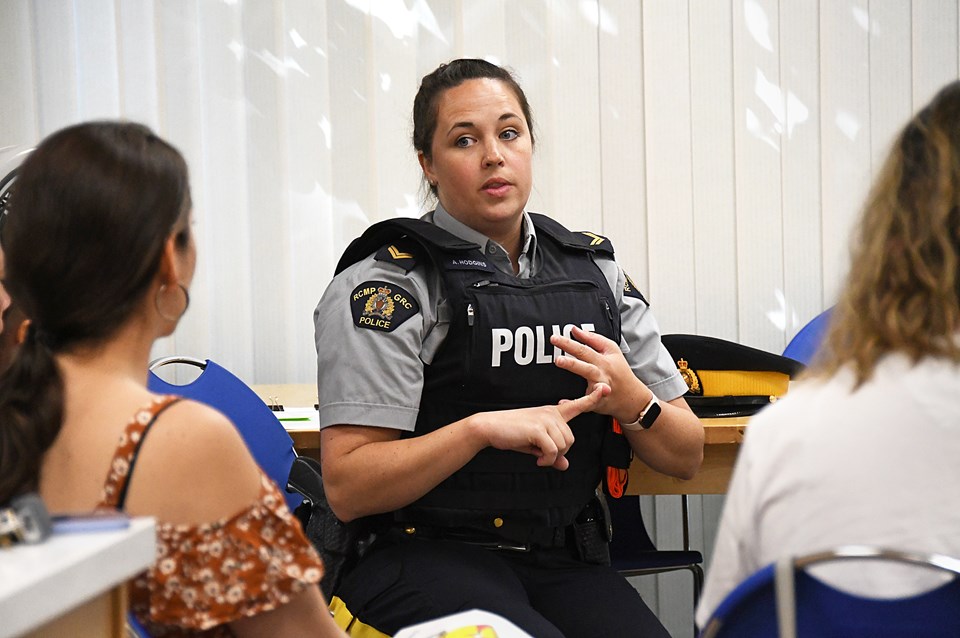Alba Correa vividly remembers the first time she was pulled over by police after coming to Canada from Colombia.
“When he came to my window, I was shaking,” she told a group of women at Burnaby Neighbourhood House recently.
Police in Colombia could not be trusted, according to Correa, and she had no reason to believe police in Canada would be any different.
“The trauma keeps with you forever,” she told the NOW.
It turned out the officer had pulled her over because she had forgotten to turn on her headlights and it was dark out.
He sent her on her way without even a fine.
Correa’s feelings about the police aren’t uncommon among women coming to Canada from other countries, according to Burnaby RCMP Cpl. Alexa Hodgins, and that’s something she tries to address in a presentation aimed at newcomer women.
“Most of these women come from countries where police are untrustworthy, mostly men, abuse their authority and corrupt,” said told the NOW.
Hodgins was at Burnaby Neighbourhood House last month talking to a group of new immigrant and refugee women in the Bridges preschool program run by Correa, who also acted as translator.
Among the half dozen women were newcomers from Colombia, Peru, Chile and Mexico.
When Hodgins asked them what their experiences with police had been like in their home countries, there were laughs.
“In my country, the police is so bad, corrupt,” said one woman from Colombia.
Another woman from Colombia agreed. “You can’t trust police. They’re supposed to protect you, but you can’t trust them.” she said.
“When you see police, you get afraid,” said a woman from Peru.
A woman from Mexico said “it’s all about money” for police in her country. “It’s chaos,” she said.
A good bit of Hodgins’s presentation is aimed at convincing the women police in Canada can be trusted and are there to help.
She tells them police in Canada are held to a “very high standard,” and RCMP members are well trained and well paid, with good benefits and have fewer inducements to resort to corruption to make ends meet than their counterparts in developing countries.
She also touches on Canada’s Charter of Rights and Freedoms.
Part of Hodgins’s presentation involves her showing and explaining all the parts of her uniform: Kevlar vest, firearm, handcuffs, magazines, pepper spray, baton, tourniquet, etc.
“There’s so much mystery behind ‘Why do you have all that stuff and what is it for?’” Hodgins said. “Taking it out one by one and explaining it really breaks down that barrier and makes each piece less intimidating when you actually see it on someone.”
But most of the presentation flows in the direction set by the group, according to Hodgins.
One topic that came up was kidnapping.
In some of the countries, kidnappings for ransom, especially of children, is common, and Hodgins explained kidnapping for ransom is extremely rare in Canada.
Other questions the women asked included questions about the kinds of crime most prevalent in the neighbourhood and whether they should be worried if neighbours threaten to call police because their kids are being too noisy.
One topic Hodgins makes sure to cover is domestic abuse, pointing the women to online resources and stressing they shouldn’t hesitate to call police.
“A lot of these women are coming from countries where it was OK to do whatever you wanted with your wife, and there were no repercussions if it happened at home,” Hodgins said.
Hodgins has presented her talk a couple times now. Such presentations were put on hold because of COVID-19 restrictions.
“It’s refreshing coming to these things because you sometimes forget how wonderful it is to live in Canada and to have our system because you just get used to it,” she said. “But when you talk to other people and they’re like ‘This is amazing,’ then you’re, like, ‘It is amazing.’”
Follow Cornelia Naylor on Twitter @CorNaylor
Email [email protected]



